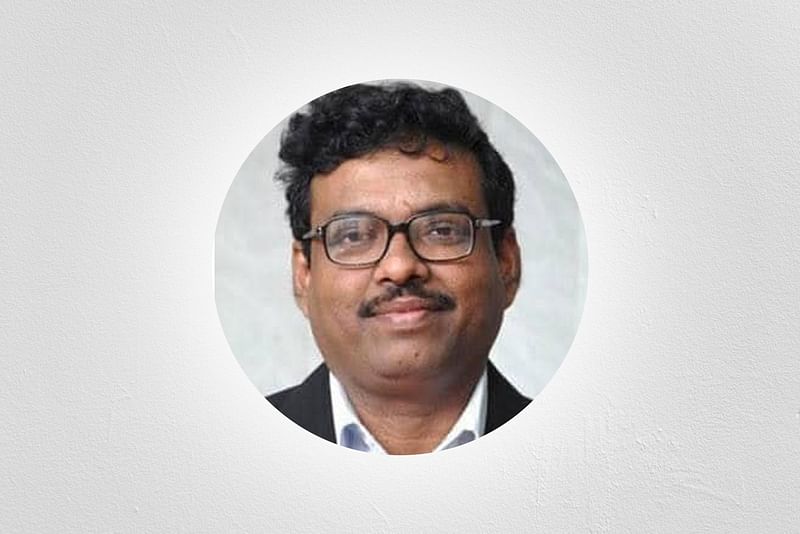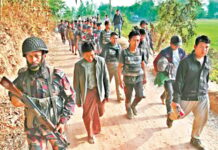
“I am improving. Love to your beloved family,” were among the last words which the late Mizanur Rahman Khan wrote me from his hospital bed as part of our last email exchanges on 5 and 6 January.
As I grow older – in my late 50’s – and importantly, as a permanent exile from Myanmar, I am very much used to watching my growing list of friends, colleagues, relatives, teachers and others in my birth-country, whom I do not have an opportunity to bid farewell in person in their last moments of breath, or whose funerals or memorial services I have never been able to attend.
The sad news of Mizan bhai’s passing however, hit me particularly hard: I saw in him similar personal attributes which I hold very dear. He was full of warmth, generous, persistent, hard-working, loving and above all passionate about seeking and speaking the Truth to power.
My friendship with Mizan bhai was a mere 3 years, compared to many Bengalis who had known and held him in high regard as a friend and colleague. But our interactions were frequent, honest, and mutually appreciative.
Mizan and I first met at the Permanent Peoples’ Tribunal on Myanmar (PPT), which was held at the University of Malaya in Kuala Lumpur with the focus on the persecution of Rohingyas and other Muslims of Myanmar in the fall of 2017. While we were engrossed in day-long proceedings at PPT, Myanmar military’s Security Clearance Operations – euphemism for the largest wave of genocidal destruction – triggered the exodus of over 740,000 Rohingya women, men and children across Myanmar’s western land and river borders into Teknaf of Bangladesh.
He was an exceptionally modest journalist who respected very much how his interviewees would approach the subject. Even though he himself had thought about it again and again, possibly more often than his interviewees
Mizan bhai deeply cared about Rohingyas who have for decades been subjected to Myanmar’s genocidal persecution. He wanted his oldest daughter to travel to refugee camps in Cox’s Bazar to bear witness to the genocide’s devastating impact on the survivors. My research colleague and wife Natalie was welcomed into their home. She stayed with his family during her stop-over in Dhaka en route Cox’s Bazar, who treated her with incredible hospitality.
Equally important, ever-the-probing journalist, Mizan bhai asked pointed legal questions during interviews with scholars and experts, with his signature disarming smile and genuine modesty. Little did I know that he taught himself constitutional law of his country, though his formal training was in accounting. In July 2018, a group of us international scholars of genocide and law from USA, Canada, UK, France and Japan travelled to Dhaka and Cox’s Bazar to meet with government officials and see first-hand how the survivors live in massively crowded refugee camps in Cox’s Bazar. Mizan would interview our group until midnight.
When I informed the other members of our group of Mizan’s passing, professor Michimi Muranushi from the Faculty of Law at Tokyo’s Gakushuin University (formerly Imperial College) recalled, “He was an exceptionally modest journalist who respected very much how his interviewees would approach the subject. Even though he himself had thought about it again and again, possibly more often than his interviewees… ” Professor John Packer of the University of Ottawa Law School chimed in, “I fully concur”. Doreen Chen, the former lead defense counsel for Khmer Rouge leader the late Nuon Chea (referred to as “Brother Number Two”), wrote of her memory of Mizan, the interviewer: “He was refreshingly insightful and critical and was clearly deeply committed to justice for Rohingya,” upon hearing the news of Mizan bhai’s passing.
In the few years I came to know Mizan bhai – through numerous email exchanges, face-to-face interviews in Dhaka, shared Bangladeshi meals at hotels.
Mizan bhai was not simply a professional journalist, doing his job, he was profoundly empathetic to Rohingya survivours of Myanmar genocide. And he used his trade to enrich the understanding of their plight as unwanted and unwelcome people either in Bangladesh or in their homeland of Western Myanmar.
His death was devastating for many of us – certainly to me – who viewed him as a kindred spirit, a fellow activist in journalist garb. Indeed Rohingyas have lost an immensely valuable friend.
What is Activism?
Maung Zarni
For 30 years, I have asked myself that perennial question.
Now that a New Year has dawned, I must ask and answer it, again.
Activism is Conscience, triggered by acute pain,
The pain of witnessing and living the state of the troubled world.
Activism is Heart, pumping empathy for “the wretched of the earth”,
From genocide victims of China, Myanmar, Sudan and the Middle East
From refugee babies and black/brown toddlers literally washed up on the affluent shores of Europe
From asylum-seekers of the other Americas and their separated children, caged by the rich America of white-settlers
From Myanmar migrant workers in semi-serfdom across ASEAN, being framed as Covid-spreaders
From destitute working-class whites and criminalised Black lives, pitted against one another
From 1.5 billion Muslims demonised in the gaze of paranoid states and racialised societies.
And my list of human wrongs goes on and on and on.
Activism is Disgust, erupting against empty rhetoric of human rights.
Activism is Rage, against Injustices rechannelled.
Activism is Principles, being lived.
Activism is Scholarship, socially engaged.
Activism is Intellect, politically applied.
Activism is Art, inspired by humans in pain.
Activism is Self, making connections.
Activism is Individual, acting in solidarity.
Activism is Humans, building communities and locking arms.
Activism is Brotherhood, universalised.
Activism is Sisterhood, pursued.
Activism is Love, shared.
Activism is Energy, recycled generations after generations.
Activism is Way of Life, Mode of Existence.
Activism is Hope, communalised.
Activism is Vision, humanised.
Activism is Kindness, randomised.
Activism is Humanity, sensitised.
Activism is Community, striving to end inhumanity and injustices.
(4 January 2021)
* Dr Maung Zarni is a scholar, educator and human rights activist with 30 years of involvement in Burmese political affairs. He has been denounced as an “enemy of state” for his opposition to the Myanmar genocide









